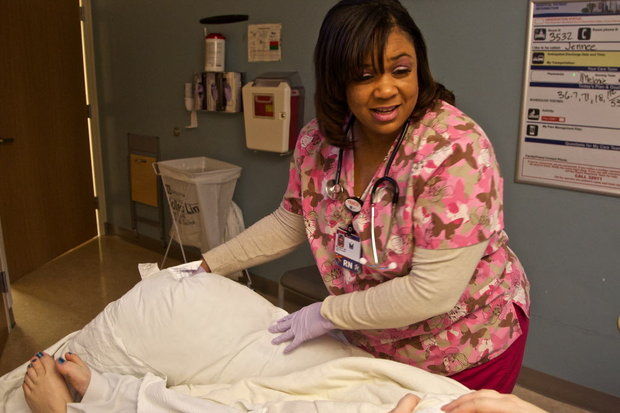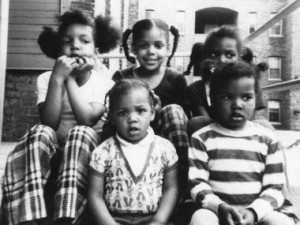

Legacy Emanuel Medical Center nurse works her way up from addiction, homelessness
(Benjamin Brink/The Oregonian)
The crowd leaned closer at that. Most of the two dozen people in the audience had their own ugly tales, of lives derailed by gambling, alcohol or violence. They were at the courthouse seeking redemption with Project Clean Slate, a program that helps people expunge criminal records and find jobs and housing.
Powell, a 41-year-old nurse at Legacy Emanuel Medical Center, looked like someone whose happy ending was never in doubt. Her pink blouse, earrings and toenail polish all matched. She prowled the front of the room like a preacher. Her face showed no signs of the decades she struggled with crack addiction.
As the Clean Slate crowd was about to learn, Powell has worked hard to escape rooms like this one. She comes back only because she hopes her own embarrassing tale can do other people some good.
“We all reach places in our life where we question what are we doing here,” she told her audience. “The one thing that I know is no matter what you’ve been through, you can get through it.”
Suburban nightmare
The story Powell tells started with her mom.
In 1980, crime was on the uptick in the family’s inner-city Minneapolis neighborhood. Powell’s mother wanted a different life for her five girls, so she used Section 8 vouchers to rent a split-level in the suburbs.
A different life didn’t necessarily mean a better one. They were the only African Americans on their block, and the only family without a father. When her mother left each morning for work as a certified nurse’s assistant, 12-year-old Powell skipped school and hopped a bus back to the city.
By 15, Powell was pregnant. Three of her older sisters were teen mothers, too. After spending a year with four pregnant girls, Powell’s mother decided to move to Oregon, where she had family. She left her older daughters behind but asked Powell to come with her.
Powell had a better offer. Her new boyfriend was not the father of her son. He drank and smoked weed. But he was cute and funny, and when he asked her to move in with him, she did.
By 18, she had four children, no job and a regular constellation of bruises from her boyfriend’s beatings. She took her first hit of crack out of curiosity, her second to feel relief. The next few years slipped by in a cloud of smoke.
Sure, she told the Clean Slate crowd earlier this year, she thought about turning her life around. Even as she descended into addiction, she earned a certified nurse’s assistant license and hoped to follow in her mother’s footsteps and become an actual nurse. She went to rehab more times than she can remember. Some of her best memories from those years are of playing with her children in a treatment center where staff set up outings to parks and plays.
After each stint in recovery, however, she returned to her boyfriend. He’d beat her again. She’d use drugs again.
“I was a young woman with all these kids,” she said of those days. “Who else is going to want me?”
In 1996, her mother wrote from Oregon. She included one-way Amtrak tickets to Oregon and a message:
“He is going to kill you.”
Hitting bottom
This is the spot in her tale when some of Powell’s listeners expected a tidy ending. The road to redemption is rarely straight or short, though. She left with her kids in the middle of the night, but that train to Portland did not put her life back on track.
In Oregon, Powell enrolled in another sobriety program. After graduation, she and the children moved into a new apartment complex for recovering addicts. She still didn’t feel at peace.
Powell didn’t have to go far to find drugs. She knew someone who knew someone. Soon she was smoking while her children were in class, then coming down from her high in time to pick them up at school. One day she didn’t, and the Oregon Department of Human Services took the kids away.
She lost the apartment and began living on the streets. She claimed a spot under Interstate 5 off North Vancouver Avenue. Each night she passed out beneath a billboard for Legacy Emanuel. The blue-eyed surgeon on the sign reminded her of the girl she’d once been, shy and pigtailed with dreams of becoming a nurse.
 Police arrested her on prostitution charges in 1999. A warrant check revealed a half dozen other reasons to keep her locked up, and a judge sentenced her to 18 months behind bars.
Police arrested her on prostitution charges in 1999. A warrant check revealed a half dozen other reasons to keep her locked up, and a judge sentenced her to 18 months behind bars.Jail turned out to be a blessing. She had no way to escape herself, no drugs or television, nothing to distract from the truths of her life. She started writing letters to the judge, asking for help.
Six months in, the judge said she could leave jail if she enrolled in an 18-month treatment center. She entered Project Network, a North Portland residential recovery program geared toward African American women with young children. She learned how to cook, create a budget and, most important, get past the shame that keeps many people from overcoming their addictions.
“She has so many strengths, but it was hard for her to see that,” said Angela Chase, a social worker at Project Network when Powell enrolled there. “We worked on stressing the positive things: ‘You left Minnesota and moved here. You’re in treatment.’¤”
She spent the next few years rebuilding her life. She earned a GED and got a job at a grocery store. Powell regained custody of her children, preteens by that point, one at a time.
Powell still wanted to become a nurse. Friends had told her that her criminal record, which included arrests for possession and manufacture of a controlled substance, precluded her working in a hospital. She called the Oregon nursing board and learned that regulators can in rare circumstances grant a license to someone who has spent time in jail.
“You have to block out everybody,” she told the Clean Slate audience. “Sometimes even your own family.”
She enrolled in Mt. Hood Community College’s nursing school, not knowing whether the state board would actually let her work once she graduated. Classwork was grueling, and Powell frequently felt in over her head. She’d never had a problem with alcohol, so she decided to drink to cope. That led to a one-time relapse with crack. She went back to Project Network for 90 days, then returned to school.
This time, she stayed clean.
A certain fit
 Melonie Powell works on the trauma unit at Legacy Emanuel Medical Center.Benjamin Brink/The Oregonian
Melonie Powell works on the trauma unit at Legacy Emanuel Medical Center.Benjamin Brink/The OregonianNursing students spend a year doing clinical rotations in a hospital, essentially an internship. Powell did hers in 2007 in the Legacy Emanuel trauma unit.
Many trauma patients are there because of drugs or alcohol. Powell’s years on the street gave her a unique perspective.
“Some patients need a certain fit. Some nurses are better suited to certain patients,” said unit supervisor Thelma Buchanan. “Trauma patients are at their most vulnerable. Melonie gets that.”
Hospital managers had plenty of applicants to choose from when a permanent nursing position opened in 2007. Eight “stellar” candidates interviewed before Powell got her turn and blew the selection panel away with her passion, said nurse manager Valarie Riggs.
Then Powell mentioned that there was one last thing they needed to discuss: “I have a past,” she said.
Powell recounted her drug use and arrests. Administrators wanted her on their team but knew the hospital’s human resources department wouldn’t be thrilled. Riggs would have to file monthly progress reports for four years under the Oregon State Board of Nursing’s nurse monitor program. Powell would have to agree to regular, random drug tests.
They hired her anyway.
Six years later, administrators say they made the right decision. Some of Powell’s patients live under bridges. They make frequent trips to Legacy. In cases where it seems appropriate, Powell shares her history and tries to guide patients toward rehab or other programs that might help them remake their lives too.
“She reminds us don’t ever underestimate someone,” said unit educator Deb Hamilton.
One morning early in her tenure at Emanuel she rounded the corner and found a different surgeon from usual working on the trauma unit. It was the doctor from the billboard.
A role model
Today Powell works full-time on the trauma unit at Legacy. She’s also back in school, studying to become a psychiatric nurse practitioner. She has reunited with her kids and is married. She’s been sober for seven years.
She tells her story to groups of recovering addicts and others in need of inspiration once a month or so.
“Most of us don’t grow up saying, ‘I want to grow up and just be nothing,’¤” she tells her listeners.
At the end of her Clean Slate talk, Powell unfurled a banner containing three late-1990s mug shots. The photos showed a woman with dull, squinted eyes. Here skin was patchy skin, her mouth downturned.
The crowd gasped.
“Yes,” Powell said. “It’s me.”
The woman in the photos looked nothing like her.
Follow on Twitter – September 27, 2013 at 8:00 AM, updated September 29, 2013 at 11:29 PM














